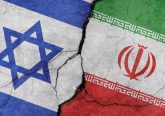 Israel’s international image has suffered tremendously in the past few years. Repeated wars in the Gaza Strip, the continued construction of housing units in Jerusalem and the West Bank, and Benjamin Netanyahu’s provocative rhetoric during his most recent bid to win re-election have poisoned the relationship between Israel and the international community. 2014 proved to be the year of Palestinian statehood recognition votes in Europe. Parliaments from Portugal to Ireland, all the way to the European Parliament in Brussels have considered recognition. Though cautiously worded, the motions indicate a change in the international mood surrounding the Middle East conflict. Netanyahu’s most recent declarations of support for the two-state solution reflect the deep concern that has spread in Israel regarding what is for the first time serious international pressure on the country. But does this necessarily translate into a bright future for the Peace Process?
Israel’s international image has suffered tremendously in the past few years. Repeated wars in the Gaza Strip, the continued construction of housing units in Jerusalem and the West Bank, and Benjamin Netanyahu’s provocative rhetoric during his most recent bid to win re-election have poisoned the relationship between Israel and the international community. 2014 proved to be the year of Palestinian statehood recognition votes in Europe. Parliaments from Portugal to Ireland, all the way to the European Parliament in Brussels have considered recognition. Though cautiously worded, the motions indicate a change in the international mood surrounding the Middle East conflict. Netanyahu’s most recent declarations of support for the two-state solution reflect the deep concern that has spread in Israel regarding what is for the first time serious international pressure on the country. But does this necessarily translate into a bright future for the Peace Process?
Netanyahu’s interest in a two-state as opposed to a one-state solution should not take us by surprise. The latter would mean an Arab majority in the would-be Jewish state. At this time, about six million Jews and six million Arabs inhabit the territories of Israel and the future Palestinian state. With a higher Arab fertility rate, Jews would soon be a minority in such a state. Moreover, Palestinians seek the right of return of their over five million refugees as part of the state-creating deal, and it is to be expected that the state would attract a greater number of Palestinian refugees than of Jews eligible to return to Israel. It follows that a one-state solution spells the unthinkable for Israel.
But what are the odds for the two-state solution? The international community, based on international law, demands that Israel dismantle its West Bank settlements. This would mean the transfer of a settler population of 350,000, parts of which are armed and ready to fight for their right to settle in what they still call Judea and Samaria. At a minimum, Jerusalem, Nablus and Hebron are holy sites. Some even believe that God needs them to settle the land in order to bring about His prophecies. Denying them this privilege amounts to a declaration of war. Any Israeli government that proposes to engage in such a transfer would be quite risk prone indeed and surely disinterested in future re-election. Comparing the evacuation of settlers from the West Bank with former Prime Minister Ariel Sharon’s disengagement from a Gaza of 8,000 settlers in 2005 is misleading.
Furthermore, at the same time as Sharon planned this unilateral withdrawal, he laid the groundwork for the construction of a “separation barrier” that would ensure the expansion of Israel’s future borders beyond the internationally recognized Green Line. The wall built upon his plans does not just cut Palestinians off from Israeli lands. Small towns such as Qalqiliya in the northern West Bank are literally surrounded by the concrete barrier. Exiting the town of close to 50,000 inhabitants is oftentimes only possible with an Israeli permit. Jewish settlements built around the Green Line have been conveniently enclosed by the wall; a new, indisputable state border has thus been established on the ground. Of course, Jerusalem is situated on the Western side of the wall. Former Palestinian President Yasser Arafat would have gone a long way to swap land for peace in the 1990s, but Jerusalem was and is out of the question for the Palestinian Authority’s constituency, parts of which are as armed and as prepared to fight for it as the Jewish settlers. Therefore, neither a return to the 1948 Green Line, nor an agreement on new state borders leaves room for optimism about the future.
These are merely three of the myriad structural obstacles that stand in the way of peace between Israel and the Palestinians. Political will on both side is certainly essential for the future of the negotiations, but it will not solve the conflict. Thus, we have to guard against giving too much attention to Netanjahu’s political declarations: They are intended to defuse international tension surrounding Israel and himself. The Middle East conflict, however, is much more complicated than that.








No Comment